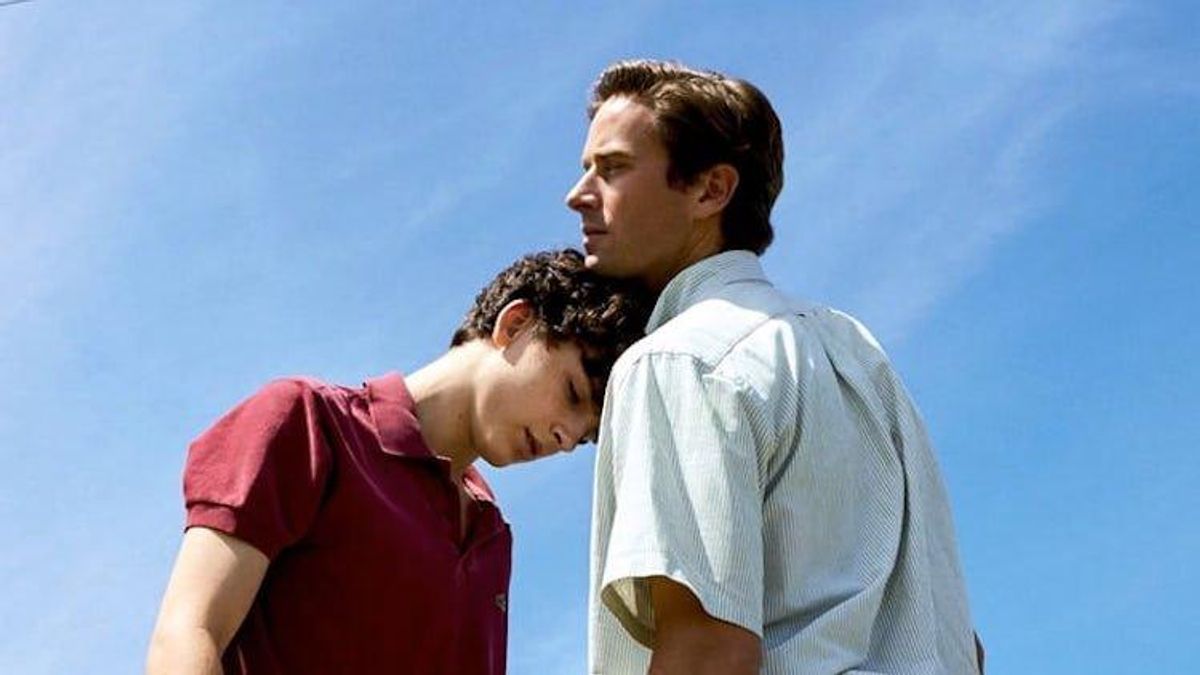There must be something in the water of Northern Italy because, as kids, parents, and lovers splash and swim through the insatiable scenes in Call Me by Your Name, magic happens.
In the critically-acclaimed adaptation of Andre Aciman's famed queer love story, we're swept into the summer romance of Elio, the youthful 17-year-old played to perfection by Timothee Chalamet, and Oliver, the older, American graduate student brought to life by Armie Hammer. As the film glides forward, glances turn to touches and confusion turns to passion in a love story that has become one of the most celebrated films of the year and set off whispers of Oscar nominations.
Related | The Art of Seduction: Armie Hammer & the Hottest Movie of the Season
Yet, before the pandemonium for the film reached a fever pitch and spilled out like a peach filled with...well, you'll see... Before all of that, the story of Elio and Oliver was encased in paper and bound with love by acclaimed author Andre Aciman when he released it in 2007. In that year, a decade ago, Britney Spears had just released Blackout, Albus Dumbledore was the year's biggest coming out story, and this unassuming straight writer released what would become a queer cultural phenomenon.
For Aciman, an essayist and novelist whose work has appeared in everything from The New Yorker and The New York Times to The Paris Review and The New Republic, Call Me by Your Name became inextricably tied to his career as he wrote more novels, including his other queer-focused love story, Enigma Variations.
As moviegoers devour every scene of Call Me by Your Name and some leave the theater hunting for peaches at their local supermarket, we sat down with Aciman to talk about avoiding queer tropes, why everyone in the film deserves an Oscar, and how he came up with that infamous peach scene.
OUT: You're a straight man who wrote a very queer novel, but with a difference: Queer fiction has historically focused on parental rejection. You've turned that around by not making that an issue--the mother and father are not the enemy.
Andre Aciman: I didn't want the parents [of Elio] to be difficult; I didn't want him to have friends who would make fun of him, and I didn't want anything like that. They're all cop-outs. I don't think I ever write seeking easy tragic cop outs--the type you see in most movies where one person gets killed, or there's an accident because people can't confront the real issue. This is a boy who feels attractive and does not feel that there is anything wrong with that. He is comfortable with himself and what he wants in life. Nobody seems to judge him. The maid in the house who barely has an inkling of what's going on doesn't even say anything
I went to see the film with some trepidation because the novel is so interior. What was your experience as a writer watching your novel turned into a movie?
I was extremely pleased in every respect. The humor stuck out to me in particular. There was a lot of humor in the film, and I think there was some in the book. My fear was not that the interior monologue was going to be lost, but that the hero was going to be lost. It was so tempting to turn everything into satire and sentimentality. We wanted to keep it lucid, sometimes clear-eyed. I did not want the adaptation to get over the top. I thought we should save those moments for when they do in fact matter. I believe they did that perfectly. I abdicated any interference in the movie. It was their film, I've done my part, and I didn't expect it to reflect the book in any way but it did. It captured everything. When I started seeing the sex scenes, I was hoping they would not go overboard. They did it in a subdued, chaste manner that was not ashamed of what was going on, but also did not give you the gory, chilling details of real sex. I didn't want to see that, and I was afraid of the peach scene because it could have easily been a pornographic scene.
You certainly create an indelible image with the peach scene. Where did that come from?
Oh my God. Don't ask me that--I have no idea, honestly. This is what fiction is all about--you tie one little idea to the next. You just go with things. I wrote the book in three and a half months. I was so cramped with the book I was writing before and I approached this one by thinking, 'Let go! Say whatever you want.' There are some things that I was going to cut out because I feel that they are a bit exaggerated or too frank. Of course, I left them in, and I said, 'if the editor wants to cut it let them decide.' But they didn't, and they liked it. In a sense, nobody on this planet has done anything like that to fruit. People laugh about it, but they understand it. They can see themselves doing that! How did I come up with that? I don't know. I was in the mood to just let the mind wander. I was fantasizing and projecting all kinds of demons if you will into that book. I have to say I enjoyed writing it. All the time I was writing this book I was in love with the main characters, I was even in love with the maid.
Elio's family is Jewish in a part of the world where there aren't many Jews. Is that drawn from your own experience?
I wanted Elio to have something that would justify, if it was needed, why he was drawn to Oliver. In other words, it made the friendship more legitimate. There were two Jews in a place where there were no Jews--automatically one would seek out the other. Oliver doesn't care about any of that stuff. He's American; he feels comfortable. Elio is not always that comfortable with himself. He says, 'I don't like myself.' But, at the same time he has desires, and he goes after what he wants. The Jewishness was there, and I debated if it was necessary. It was a metaphor for two strangers meeting in a desert and finding out that they have common ancestors.
There's a gay character in your latest novel, Enigma Variations, as well. Is that related to enjoying the experience of writing Call Me by Your Name?
I've written several gay characters because, where there are no real boundaries, it's like an unexplored land that allows me to let my imagination go and take all kinds of risks without fear. Writing about a man and a woman--which I'm doing now--is always a bit more difficult. I don't know why and I must say that it's not as exciting for a writer like me.
Can you talk about what the actors brought to their performances?
I'll give you an example: there's a moment immediately after the peach scene when Armie is going to eat it, and Timothee just pulls away his hand, and they're struggling. He says, 'You're hurting me,' and Armie won't let go. I don't know what happened to Timothee or to Luca, but in that scene Timothee explodes into tears and hugs Armie. At that moment I said, 'These two kids are such fantastic actors that there's only one explanation for this--it has to be true!' I think that's the crowning achievement for any artist--for an actor to believe that lines and a made up role becomes him. It's like Laurence Olivier who becomes Othello. The transposition is so direct and so real and persuasive that, as the writer, I find myself saying, "Wow they've done better than the book." They all deserve Oscars. The acting was perfect.

























































































